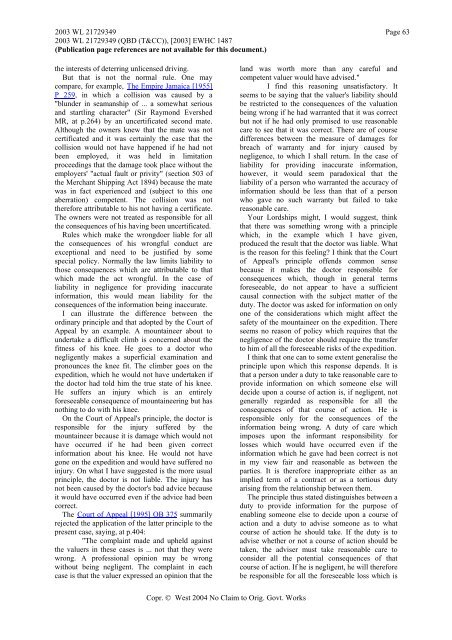Tesco v Constain - Thomson Reuters
Tesco v Constain - Thomson Reuters
Tesco v Constain - Thomson Reuters
Create successful ePaper yourself
Turn your PDF publications into a flip-book with our unique Google optimized e-Paper software.
2003 WL 21729349 Page 632003 WL 21729349 (QBD (T&CC)), [2003] EWHC 1487(Publication page references are not available for this document.)the interests of deterring unlicensed driving.But that is not the normal rule. One maycompare, for example, HThe Empire Jamaica [1955]P 259, in which a collision was caused by a"blunder in seamanship of ... a somewhat seriousand startling character" (Sir Raymond EvershedMR, at p.264) by an uncertificated second mate.Although the owners knew that the mate was notcertificated and it was certainly the case that thecollision would not have happened if he had notbeen employed, it was held in limitationproceedings that the damage took place without theemployers' "actual fault or privity" (section 503 ofthe Merchant Shipping Act 1894) because the matewas in fact experienced and (subject to this oneaberration) competent. The collision was nottherefore attributable to his not having a certificate.The owners were not treated as responsible for allthe consequences of his having been uncertificated.Rules which make the wrongdoer liable for allthe consequences of his wrongful conduct areexceptional and need to be justified by somespecial policy. Normally the law limits liability tothose consequences which are attributable to thatwhich made the act wrongful. In the case ofliability in negligence for providing inaccurateinformation, this would mean liability for theconsequences of the information being inaccurate.I can illustrate the difference between theordinary principle and that adopted by the Court ofAppeal by an example. A mountaineer about toundertake a difficult climb is concerned about thefitness of his knee. He goes to a doctor whonegligently makes a superficial examination andpronounces the knee fit. The climber goes on theexpedition, which he would not have undertaken ifthe doctor had told him the true state of his knee.He suffers an injury which is an entirelyforeseeable consequence of mountaineering but hasnothing to do with his knee.On the Court of Appeal's principle, the doctor isresponsible for the injury suffered by themountaineer because it is damage which would nothave occurred if he had been given correctinformation about his knee. He would not havegone on the expedition and would have suffered noinjury. On what I have suggested is the more usualprinciple, the doctor is not liable. The injury hasnot been caused by the doctor's bad advice becauseit would have occurred even if the advice had beencorrect.The HCourt of Appeal [1995] QB 375 summarilyrejected the application of the latter principle to thepresent case, saying, at p.404:"The complaint made and upheld againstthe valuers in these cases is ... not that they werewrong. A professional opinion may be wrongwithout being negligent. The complaint in eachcase is that the valuer expressed an opinion that theland was worth more than any careful andcompetent valuer would have advised."I find this reasoning unsatisfactory. Itseems to be saying that the valuer's liability shouldbe restricted to the consequences of the valuationbeing wrong if he had warranted that it was correctbut not if he had only promised to use reasonablecare to see that it was correct. There are of coursedifferences between the measure of damages forbreach of warranty and for injury caused bynegligence, to which I shall return. In the case ofliability for providing inaccurate information,however, it would seem paradoxical that theliability of a person who warranted the accuracy ofinformation should be less than that of a personwho gave no such warranty but failed to takereasonable care.Your Lordships might, I would suggest, thinkthat there was something wrong with a principlewhich, in the example which I have given,produced the result that the doctor was liable. Whatis the reason for this feeling? I think that the Courtof Appeal's principle offends common sensebecause it makes the doctor responsible forconsequences which, though in general termsforeseeable, do not appear to have a sufficientcausal connection with the subject matter of theduty. The doctor was asked for information on onlyone of the considerations which might affect thesafety of the mountaineer on the expedition. Thereseems no reason of policy which requires that thenegligence of the doctor should require the transferto him of all the foreseeable risks of the expedition.I think that one can to some extent generalise theprinciple upon which this response depends. It isthat a person under a duty to take reasonable care toprovide information on which someone else willdecide upon a course of action is, if negligent, notgenerally regarded as responsible for all theconsequences of that course of action. He isresponsible only for the consequences of theinformation being wrong. A duty of care whichimposes upon the informant responsibility forlosses which would have occurred even if theinformation which he gave had been correct is notin my view fair and reasonable as between theparties. It is therefore inappropriate either as animplied term of a contract or as a tortious dutyarising from the relationship between them.The principle thus stated distinguishes between aduty to provide information for the purpose ofenabling someone else to decide upon a course ofaction and a duty to advise someone as to whatcourse of action he should take. If the duty is toadvise whether or not a course of action should betaken, the adviser must take reasonable care toconsider all the potential consequences of thatcourse of action. If he is negligent, he will thereforebe responsible for all the foreseeable loss which isCopr. © West 2004 No Claim to Orig. Govt. Works
















